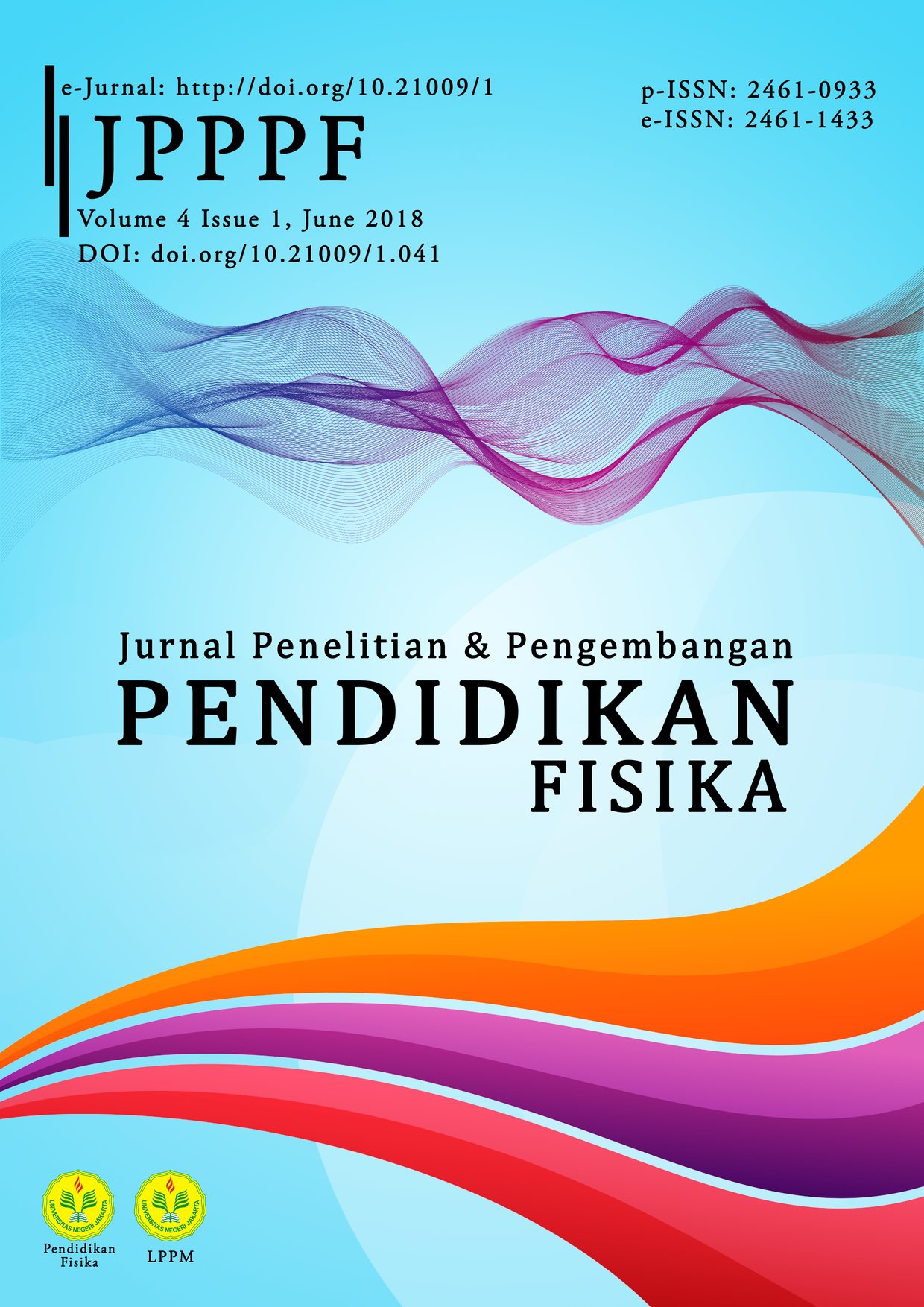Implementation of Problem-Based Learning to Improve Physics Learning Outcomes of Class X IPA-4 in SMA 59
DOI:
https://doi.org/10.21009/1.04105Keywords:
PBL, CAR, CCAR, Physics, SMAN 59Abstract
This study aims to produce a problem-based learning (PBL) model to improve students' physics learning outcomes. The study was conducted from July to September 2016 at SMAN 59 Jakarta. The subjects of the study were students of class X IPA-4 which amounted to 36 people. The method used in this research is Collaboration Classroom Action Research (CCAR). The classroom action research model used is Carr & Kemmis model. The analysis of a learning is reflected in the next lesson. This study consists of three cycles, and each cycle consists of 2 to 6 meetings. From the result of research, the result of cognitive learning of students in cycle I obtained the average test value 56,2 with classical mastery 5,88%. In cycle II, the average value of 75.1 test with 55.88% classical completeness. In cycle III, the average score of 85.1 test with 91.8% classical completeness. Effective learning outcomes in cycle I, the average score 73.1 students with 20.59% complete learning. In cycle II, the average score of 77.1 students with 73.53% complete classical learning. In cycle III the average score 82.1 students with 100% complete learning. Psychomotor learning result in cycle I, average score 74,6 with 50% classical learning completeness. Cycle II, the average value of 80 with 100% complete classical completeness. Cycle III, the average value of 82.7 with 100% complete classical learning. It can be concluded that with the application of problem-based learning method can improve student learning outcomes of class X SMA Negeri 59 Jakarta Lesson Year 2015/2016.
References
Carr, W, & Kemmis, S 2004, Becoming Critical: Education, Knowledge, and Action Research, Routledge Farmer, London, p. 186, ISBN 0-203-49662-0.
Ceker, E, & Ozdamil, F 2016, ‘Features and Characteristics of Problem Based Learning’, Copriot Journal of Education
Sciences, vol. 11, Issue 4, pp. 195-202.
Departemen Pendidikan Nasional, 2006, Standar Kompetensi Mata pelajaran Fisika, Pusat Kurikulum dan Perbukuan, Departemen Pendidikan Nasional, Jakarta, pp. 443-444.
Genereo, VR, & Lyons, R 2015, Problem-Based Learning: Six Steps to Design, Implement, and Assess, diakses 1 September 2018, https://www.facultyfocus.com/articles/course-design-ideas/problem-based-learning-six-steps-to-design-implement-and-assess/.
Halim, A, Suriana, S, & Mursal, M 2017, ‘Dampak Problem Based Learning terhadap Pemahaman Konsep Ditinjau dari Gaya Berpikir Siswa pada Mata Pelajaran Fisika’, JPPPF - Jurnal Penelitian & Pengembangan Pendidikan Fisika, vol. 3, no. 1, Juni 2017, pp. 1-10, DOI: doi.org/10.21009/1.03101
Julita, J 2018, ‘Peningkatan Kemampuan Pemecahan Dan Hasil Belajar Matematika Melalui Problem Based-Learning’, Jurnal Mosharafa, vol. 7, no. 1, Januari 2018, pp. 143-154, e-ISSN: 2527-8827
Khotimah, K 2017, ‘Penerapan Model Problem Based Learning dengan Pendekatan Kontekstual pada Materi Bangun Ruang Sisi Datar Siswa Kelas VIII’, Jurnal Eduscope, vol. 3, no. 2, Januari 2017, pp. 23-29, e-ISSN : 2502 – 3985.
Malik, A 2015, ‘Model Pembelajaran Problem Based Instruction untuk Meningkatkan Penguasaan Konsep dan Keterampilan Proses Sains Mahasiswa’, JPPPF - Jurnal Penelitian & Pengembangan Pendidikan Fisika, vol. 1, no. 1, Juni 2015, pp. 9 – 15, DOI: doi.org/10.21009/1.01102
Rusman, 2014, ‘Penerapan Pembelajaran Berbasis Masalah’, Jurnal Edutech, vol. 1, no. 2, Juni 2014, pp. 211 – 230.
Rusman, 2017, Belajar dan Pembelajaran: Berorientasi Standar Proses Pembelajaran, Kharisma Pitra Utama, Jakarta, p. 21, ISBN 978-602-442-063-1.
Sari, AP, Feranie, S, & Karim, S 2015, ‘Penerapan Pembelajaran Berbasis Masalah dengan Pendekatan Multirepresentasi untuk Meningkatkan Prestasi Belajar dan Konsistensi Ilmiah Berbasis Multirepresentasi pada Materi Elastisitas’, JPPPF - Jurnal Penelitian & Pengembangan Pendidikan Fisika, vol. 1, no. 2, Desember 2015, pp. 45-50, DOI: doi.org/10.21009/1.0120
Sari, SM, Indrawati, I, & Handayani, RD, 2016, ‘Pengaruh Model Pembelajaran PBL (Problem Based Learning) Terhadap Keterampilan Proses dan Hasil Belajar Siswa dalam Pembelajaran Fisika di SMP’, Jurnal Pembelajaran Fisika, vol. 5, no. 2, September 2016, pp. 103 – 108.
Sari, IP, Yushardi, Y, & Subiki, S 2015, ‘Penerapan Model Problem Based Learning (PBL) Berbantuan Media Kartu Bergambar Terhadap Kemampuan Berpikir Kritis dan Hasil Belajar Siswa dalam Pembelajaran Fisika SMK Negeri di Kabupaten Jember’, Jurnal Pembelajaran Fisika, vol. 4, no. 3, Desember 2015, pp. 268 – 273.











